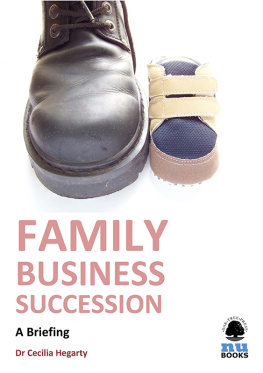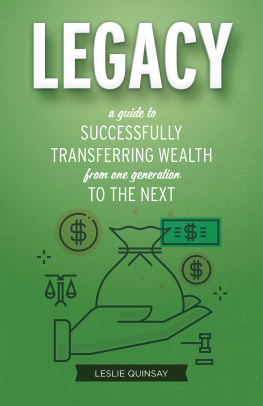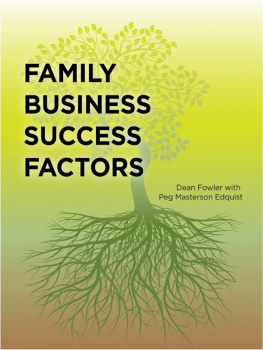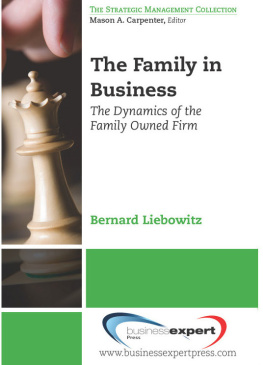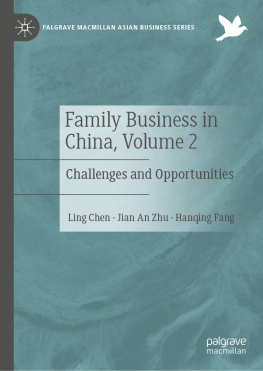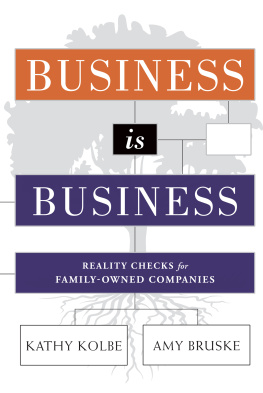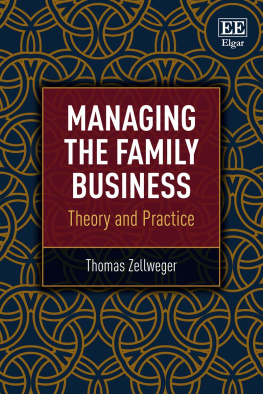FAMILY BUSINESS SUCCESSION
A Briefing
DR CECILIA HEGARTY

Published by NuBooks, an imprint of Oak Tree Press, 19 Rutland Street, Cork, Ireland
www.oaktreepress.com
ISBN: 978-1-84621-119-5 (PDF)
ISBN: 978-1-84621-120-1 (ePub)
ISBN: 978-1-84621-121-8 (Kindle)
2012 Dr Cecilia Hegarty.
Image credit: 123RF Stock Photo
All rights reserved. This eBook may not be reprinted or distributed in electronic, print, web or other format without express written permission.
This publication has been carefully prepared to provide broad guidance in the general context of family businesses in Ireland. The author of this publication acknowledges the limitations of this brief text in that it cannot be relied upon in specific situations. Readers are advised to obtain professional support and guidance on their unique challenges to the succession process.
INTRODUCTION
Family businesses are said to make up the majority of businesses in the SME sector; hence the loss of family businesses can have serious impacts on social and economic stability. Family businesses are unique in the sense that they each have different objectives and patterns of behaviour. This may be in part because of different fiscal environments or due to the differences in family life between cultures and countries.
But first, what is a family business? My definition is that it is an operating business in which members of the same family have most of the power. This could be one nuclear family (two parents and children), a multi-generational family (grandparents, parents and children) or a network of families (an extended family or clan). Often, all the ownership is concentrated in the same family but, in reality, a family will have power to do most things they want in a business if they control more than half its ownership.
Family businesses face increasingly complex issues that affect not only the future of the business itself, but also that of its owners, their family and their employees. Always, the owner must reconcile their own and their familys aspirations with the commercial goals of the company.
In relation to the key issue of succession, the owner is faced with many questions:
- Should I try to solve the issues myself or take independent advice?
- How can I motivate family and non-family employees for the journey?
- Who should be my successor(s)?
- When should my successor(s) get started in their new role?
- Will my successor(s) be able to cope with the burden?
- Can I financially afford to lose the succession battle?
- Will I be emotionally able to sell out?
These types of dilemmas affect most family businesses at some stage in their life cycle yet the lack of written guidance for family business owners leaves them feeling somewhat adrift.
There is such a poor survival rate for family businesses studies suggest fewer than 2.5% to 3.5% survive beyond the third generation because family business owners fail to plan the succession of their company dubbed the do nothing approach. Usually by the time the problems associated with succession surface, it is too late to take action, the damage is beyond repair and the business is on the brink of failure because the needs of the owner, the family and the business are divergent. Even where the family can pull a business back from the brink, family businesses can display lower growth levels than non-family alternatives.
My experience of working with family businesses leaves me in no doubt that the chances of family business survival can be increased if the life-threatening questions are tackled early on and head-on and all key stakeholders are involved in planning the future of the company and their role in it.
Why do family business owners fail to plan their succession?
The question remains: If succession is so important to the future of the business (and by extension, to the livelihood of the family and community), why do family business owners not engage with succession planning?
Being at the helm of any enterprise is challenging. Entrepreneurs, by their nature, tend to become involved in managing all aspects of their business. In many cases, this is the reason they want to work for themselves: so that they can control the diverse aspects of their business. It is easy for family business owners to focus on the day-to-day management activities of the company, which can detract from attention to the bigger picture.
Human nature also makes it easy to put off succession planning. This reluctance to face the issues associated with succession arises first out of the twin notions that we dont have time to deal with the issue right now and it is not an issue that we can sort out quickly. In addition, there is a lack of persuasive evidence to suggest how business owners might tackle succession and the consequences of succession planning for the firm and for the family. However, if the business is to remain in family hands beyond the lifetime of the owners, careful planning is required to transfer ownership into the right hands in the next generation.
My experience of working intensively with family SMEs has highlighted that family business owners are keen to learn more about themselves. Family business owners acknowledge the difficulty of planning their individual and company succession and they want to better understand the process and what it entails.
This brief guide, therefore, is intended to provide family business owners, family members and non-family employees working in family firms with guidance for succession planning. However, it does not address the financial taxation or regulatory aspects of transfer of ownership of family businesses, as these vary from business to business and from country to country and research shows that they are not the key issues in successful succession. Instead, it is emotion and relationship-based issues that make or break succession.
DEBUNKING SOME MYTHS
Due to a lack of written evidence associated with the succession of family businesses, we tend to rely on hearsay. And because there is a lack of readily available examples that we can easily draw upon, we tend to over-cite the one or two examples that we know of and so they become gospel. Moreover, these famous examples tend to relate to well-known larger ventures, whereas the majority of family businesses tend to be small to medium-sized enterprises (SMEs); hence, the potential value of these examples as a comparator is diluted.
Moreover, each family business is unique and the issues it faces also are unique to that particular business or family and the individuals within it. It is only when we have a rich body of collective evidence that we can begin to see patterns emerging and, therefore, become able to draw some tentative conclusions about family businesses.
In the meantime, lets debunk some of the myths associated with succession planning before discussing the challenges of succession for family businesses.
Myth 1: Succession planning is futile since change is constant
Many family businesses are long-established. From humble beginnings, they grew organically on money ploughed back into the business from profits at the owners own discretion, often without informing any family members. Being an entrepreneur, the owners tend to survive with little money personally at the beginning of their venture and their families accept this sacrifice.
In addition, the family business owner may not be used to business planning. Indeed, the entrepreneur may well have a natural aversion to planning because of their instinctive desire to maintain control of their creation.
Next page
